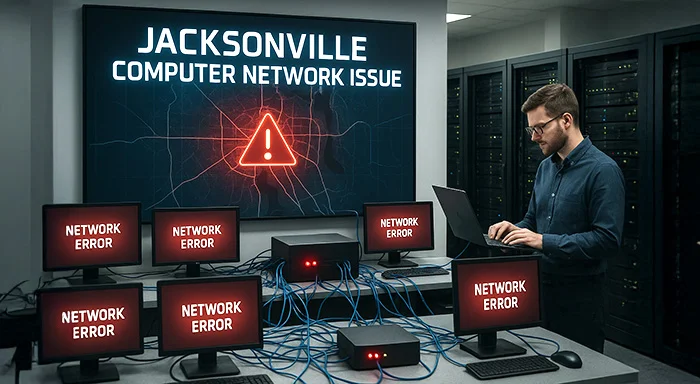In the digital age, computer networks are the lifeline of homes, schools, and businesses. When a network issue occurs, it can feel like everything has stopped — no emails, no browsing, no access to online data. Recently, Jacksonville faced a major computer network issue, affecting many systems and reminding everyone how essential stable connectivity is in modern life.
This article explores the causes, effects, and solutions to computer network issues that can impact any area, including Jacksonville. Whether you’re a business owner, IT manager, or a remote worker, understanding how to handle online issues can save you from frustration and downtime.
Understanding the Jacksonville Computer Network Issue
A computer network issue can occur for many reasons — hardware failure, configuration errors, or external damage. In Jacksonville, such incidents can affect local businesses, homes, and even public offices. A single network failure can interrupt communication, reduce productivity, and create costly downtime.
Most computer network issues are not caused by a cyber-attack but by technical problems within the system. However, when computers and networks fail, the result feels the same — systems go offline, emails stop syncing, and websites become unreachable.
Common Causes of Network Issues in Jacksonville
- Hardware Failures Computers and networks rely on physical devices like routers, switches, and cables. When these devices fail, the connection breaks. Aging equipment or power surges can also damage network components, resulting in slow or lost connectivity.
- Software and Configuration Errors Incorrect network settings or software updates can cause major disruptions. A small configuration mistake, like a wrong IP address or firewall setting, can disconnect computers from the internet or local servers.
- Bandwidth Overload Jacksonville has a growing number of remote workers and online businesses. When too many users or devices share the same network, bandwidth gets overloaded. This leads to slower speeds, buffering, and disconnections.
- Environmental and Weather Damage Heavy rain, humidity, and storms can physically damage cables or affect network hardware. Jacksonville’s coastal climate makes outdoor network equipment vulnerable to corrosion and electrical issues.
- Security Threats Malware or unauthorized network access can slow down or completely disable computers and servers. Even when security isn’t the main cause, weak protection can make the network more fragile.
- Outdated Infrastructure Many older offices and buildings in Jacksonville still use outdated networking systems. Old routers, unshielded cables, and obsolete switches can’t handle modern online requirements.
Impact of Network Issues on Businesses and Homes
When a computer network issue strikes, it affects every aspect of daily life — from online meetings to streaming videos. Let’s look at how different users experience it:
1. Businesses
For businesses in Jacksonville, every minute of downtime can mean lost income. Employees can’t send emails, access cloud files, or connect to online databases. For service providers, customers may not be able to make online payments or contact support. Long-term issues can damage the company’s reputation.
2. Homes and Remote Workers
For households, network problems interrupt online education, entertainment, and communication. Remote workers depend on steady connections to attend meetings or manage tasks. When Wi-Fi or LAN fails, productivity stops instantly.
3. Public Services
If a city department or hospital faces a computer network failure, even a small glitch can affect public safety or emergency response. Delayed systems or offline communication channels can cause confusion and inconvenience for citizens.
How to Diagnose and Fix Computer Network Issues
When faced with a network problem, you don’t always need to panic. Follow these practical steps to identify and fix the issue efficiently.
Step 1: Check the Basics
- Ensure the computer, modem, and router are powered on.
- Check all cable connections and make sure nothing is loose or damaged.
- Restart your computer and network equipment. Many temporary issues disappear after a quick reboot.
- Run a simple connection test by opening a few websites or pinging the router.
Step 2: Examine the Hardware
- Inspect the router lights — if any are red or blinking abnormally, there might be a signal issue.
- Replace damaged cables or ports.
- Ensure your hardware is not overheated or placed in an area with poor ventilation.
- If the router or switch is several years old, consider upgrading to a modern device.
Step 3: Test Network Settings
- Check the IP address configuration on your computer.
- Reset the DNS settings if certain websites are not loading.
- Disable any unnecessary VPNs or proxies that may slow down your connection.
- Update router firmware and ensure all computers are using the latest drivers.
Step 4: Reduce Network Load
If your Wi-Fi slows down when multiple devices are active, try these solutions:
- Disconnect idle devices.
- Limit heavy downloads or streaming during work hours.
- Upgrade your internet plan or install a dual-band router to handle more devices.
Step 5: Strengthen Security
- Use strong passwords for your Wi-Fi network.
- Install reliable antivirus and firewall software.
- Disable file sharing if you don’t need it.
- Regularly scan your computers for malware or suspicious programs.
Step 6: Seek Professional Support
If your computer network issue continues even after basic troubleshooting, contact a local IT technician in Jacksonville. Professionals can perform a deep diagnostic test to find hidden issues in hardware or network settings.
Preventing Future Network Problems
Solving a computer network issue once is good — but preventing it from happening again is even better. Here’s how to maintain a stable, long-term network environment:
- Regular Maintenance
Schedule monthly checks on cables, routers, and switches. Clean dust from network devices and ensure they are updated with the latest firmware. - Upgrade Outdated Equipment
Modern networks require faster routers, high-speed Ethernet cables, and efficient switches. Replacing old devices ensures compatibility with modern online services. - Monitor Network Performance
Use monitoring tools to check your bandwidth usage, detect unusual activity, and identify slow points in the network. - Create Backup Connectivity
For businesses, having a backup internet provider or mobile hotspot can keep systems running during outages. - Educate Users
Teach employees or family members to avoid downloading unverified software or visiting unsafe websites. Human error is a major cause of online issues. - Secure Your Network
Use encryption, firewalls, and password protection to prevent intrusions. A secure network is not only faster but also more reliable. - Environmental Protection
Keep equipment away from direct sunlight or moisture. Use surge protectors to avoid damage during power fluctuations or storms — especially important in Jacksonville’s weather.
Why Jacksonville’s Example Matters
The Jacksonville computer network issue shows that even strong systems can fail when overlooked. It’s a reminder that every computer and online system needs regular attention, maintenance, and updates. Whether it’s a single user or an entire organization, network health directly impacts success and stability.
Local businesses learned the importance of having contingency plans and backup systems. Home users, too, realized that protecting Wi-Fi networks and keeping computers updated can prevent sudden outages.
Final Thoughts
Every computer and online network depends on consistent care. In Jacksonville, the recent computer network issue was a wake-up call — emphasizing that technology, no matter how advanced, requires monitoring and maintenance.
If you live or work in Jacksonville and face network slowdowns or disconnections, start with simple checks and move toward professional support if needed. Prevention through upgrades, monitoring, and security is the best defense against future downtime.
In today’s digital environment, where everything from communication to payments happens online, a healthy network isn’t just a convenience — it’s a necessity. So keep your computer systems updated, your connections secure, and your network ready for whatever comes next.



